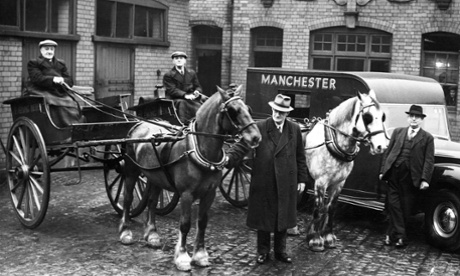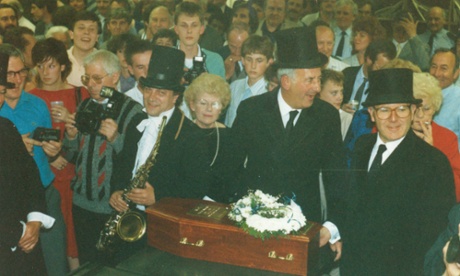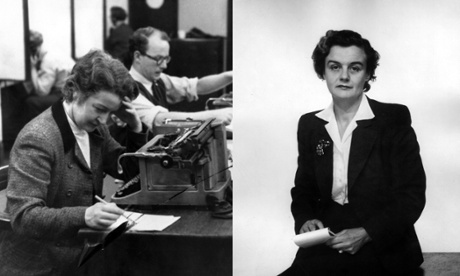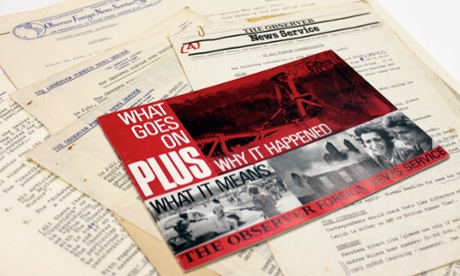Early 19th century Manchester was an expanding industrial city with a rapidly growing population. Poor social and economic conditions, electoral corruption and lack of representation in parliament led to increasing radicalism and calls for reform. It was in this environment that a young John Edward Taylor worked initially as a cotton manufacturer and later as a merchant.
Taylor took an early interest in reform and public affairs. He regularly wrote political articles, most notably for the Manchester Gazette, one of the few non-Tory newspapers in Manchester at the time. By 1815 he was meeting with other Manchester based liberals to debate reform for industrial cities. This group was known as the Little Circle and included some of the men who later helped Taylor to finance the Manchester Guardian. After winning a libel case against the Tory politician John Greenwood in March 1819, Taylor was encouraged by his friend John Childs to start a newspaper. A few months later in August 1819 he witnessed first-hand an event known as the Peterloo massacre, where at least 15 people were killed and hundreds injured after the yeomanry entered the crowds of a demonstration for parliamentary reform. Taylor is believed to have written an account of the event for The Times and later served on a committee that helped the victims.
As a result of these events and the environment in Manchester at the time, Taylor and his 11 friends began looking for opportunities to establish a newspaper in Manchester with a liberal reformist voice. They sought advice from the editors and proprietors of liberal reformist newspapers such as the Leeds Mercury and Glasgow Chronicle. They then approached William Cowdroy with an offer to purchase his Manchester Gazette. This was turned down and Taylor later decided to start his own newspaper.
The loan given to help Taylor set up the Manchester Guardian was arranged through a legal agreement dated 28 April 1821. The 11 backers were George William Wood, Edward Baxter, George Philips, T. B. W. Sanderson, Robert Philips, Thomas Potter, William Duckworth, Thomas Wilkins, Richard Potter, Samuel Pullein and Thomas Johnson. All were liberal reformers and worked within the textile trade in and around Manchester. The agreement states that £1100 would be given to Taylor, with each man paying £100.
The terms of the agreement stipulated that Taylor would be responsible for “…establishing, editing conducting and managing a certain newspaper to be published weekly in Manchester aforesaid under the name or title ‘The Manchester Guardian’.” The terms were favourable to Taylor. He would be the editor and sole proprietor of the newspaper, owning all parts of it including its copyright. He would not be personally liable for the debt, and repayments would be made with interest from the proceeds of the newspaper if and when it was in a financial position to do so. This would be after any costs associated with running the newspaper such as rents, taxes and salaries had been paid.
In return, Taylor was to keep accurate accounts which would be inspected by George William Wood, Edward Baxter and Thomas Wilkins twice yearly in January and July. They were required to give Taylor two months notice to return any monies or interest owed. If he did not pay or died, the three creditors could sell and dispose of the newspaper to recover debts owed. Once the debt had been repaid, Taylor (or his executors) would be free from the terms of the agreement and to receive any profits the newspaper made.
The first edition of the Manchester Guardian was published on 5 May 1821, only a week after the agreement had been signed. At seven pence the high cost of the newspaper (due to stamp duty on newspapers) kept the circulation low, so to make the paper profitable Taylor turned to advertising. With its detailed reporting of parliamentary meetings, trade (particularly the cotton trade) and European news, the Manchester Guardian reached out to a wide range of readers. The Guardian biographer David Ayerst notes that through his role as a commissioner for the Market Street improvements, Taylor worked closely with neutral, Tory and Whig businessmen who despite not all sharing his political or religious views were interested in reading what Taylor had to say. This made the newspaper attractive to advertisers. Between 1821 and 1823 the number of adverts appearing in the newspaper increased from 36 to 100 and circulation from around 1000 to 1865.
Taylor’s connections with Tory businessmen and the editorial direction of the newspaper was not to the liking of some of the 11 backers who wanted a more radical newspaper that would attack the Tories at every possible opportunity. However, with the terms of the loan stating that Taylor would be sole owner and editor, they had no right to a say in what was published. Taylor made the newspaper profitable and by May 1824 he had repaid the last instalments of the original loan made in April 1821.
The Manchester Guardian agreement (reference number 260/42) forms part of the Guardian Archive (1821-1970s), which is held at the The University of Manchester Library. The Guardian Archive can be accessed by advanced appointment in the reading rooms of the John Rylands Library. Further information about this collection including catalogues and how to access it is available on The University of Manchester Library website.
More recent records of the Guardian are held in the Guardian News & Media Archive (GNM Archive) in London. Further information about these collections is available on the GNM Archive website.











